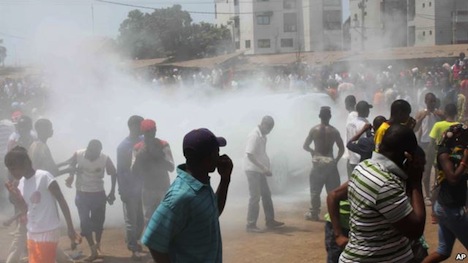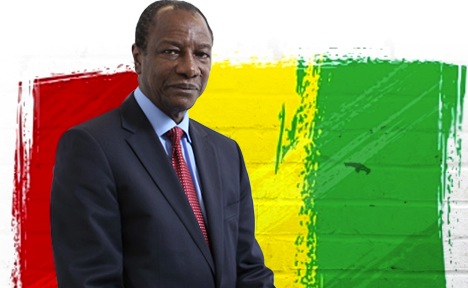Guinean voters were set to participate in their first parliamentary elections in over a decade later this well, despite protests over the vote earlier this year that overshadowed the elections and despite the fact that Guinea’s parliament hasn’t even met since 2008.![]()
But it seems increasingly likely that the scheduled June 30 elections will be postponed yet again after opposition protests over fairness and transparency, following six years of delay and political turbulence — just last week, fresh violence led Guinea’s opposition to pull out of talks with the government over the long-delayed election to its unicameral Assemblée nationale (National Assembly) of Guinea.
Its francophone neighbor to the north, Senegal, has a long history with democracy and, just last year, marked its second consecutive peaceful, post-election transfer of power when Macky Sall overwhelming defeated incumbent Abdoulaye Wade in the March 2012 presidential election.
Meanwhile, Guinea is still learning the ropes of democratic elections — it held its first direct election for president only in 2010. The ultimate winner, Alpha Condé, only narrowly defeated Cellou Dalein Diallo in the runoff, on a vote that broke on largely ethnic lines, with Condé consolidating support among the Malinke ethnic group (around 30% of Guinea’s population) and the Susu groups (around 20%), and with Diallo winning the support among his own Fula group (40% of Guinea’s population).
The disparity in rule of law and democratic institutions matters.
Guinea’s population (10.25 million) is just slightly less than that of Senegal’s (12.75 million), but its economy is less than one-half the size of Senegal’s, giving Guinea a GDP per capita of something like $1,100 to something like $2,000 for Senegal.
The 2010 election followed a relatively despotic era of governance for a country that came into being amid controversy.
Guinea’s independence came after French president Charles de Gaulle called a referendum in September 1958 throughout 12 of France’s mostly African colonial holdings, and 11 of those colonies overwhelmingly supported de Gaulle’s efforts for a new constitution for what would become the French Fifth Republic.
The sole holdout, however, was Guinea, which voted overwhelmingly (over 95%) against the constitution after the passionate campaigning of Guinea’s prime minister, Ahmed Sékou Touré, a former trade union leader who, unlike other west African elites in French West Africa, opposed the referendum. Touré declared Guinea’s independence four days after the French referendum, angering de Gaulle, who responded by withdrawing all economic, military and civil bureaucratic aid to Guinea, with longtime French aides leaving nearly immediately following Guinean independence. Guinea’s example, however, was a harbinger of the widespread independence that was to follow throughout the rest of French West Africa by 1960, in large part due to the example of Guinea and with encouragement from Touré.
Unfortunately for Guinea, however, Touré turned to the Soviet Union after France so hastily ruptured ties. Moreover, Touré’s passion for vigorous democracy ended with the 1958 referendum, and he quickly established the People’s Revolutionary Republic of Guinea as a single-party socialist dictatorship in the mould of a Soviet client state. Until his death in 1984, Touré orchestrated a state where rule of law meant arbitrary trials, repression, imprisonment, torture and death — Touré’s regime became well-known for ‘la diète noire,’ an especially gruesome form of tortured execution whereby prisoners were denied food or water until they died.
Lansana Conté, his successor, who ruled Guinea from 1984 until his own death in 2008, was, at the very least, a less repressive leader, and his economic reforms began to help Guinea to take advantage of its abundant coastline and agricultural potential, in addition to its longstanding mineral wealth — Guinea is the world’s largest exporter of bauxite, an aluminum ore, and bauxite amounts to over 60% of the country’s exports. Though Conté attempted to introduce multi-party democracy in Guinea in the 1990s, it never quite took root, and Conté remained firmly in power until his death, though his semi-authoritarian regime lacked the more brutal qualities of the Touré years. Conté’s last years in office were troubled — he spent much of the early 2000s fending off the danger that wars in neighboring Sierra Leone and Liberia would destabilize Guinea by dragging it into conflict, and he spent much of the mid-2000s fending off internal strife in his own country, with general strikes and other protests against Guinea’s lack of economic and political progress. Indeed, the current parliamentary elections that Guinea is still struggling to hold were originally scheduled to be held in 2007 when Conté was still alive.
Conté’s death, however, opened a yet another tragic chapter in Guinean history, which also began with a military coup that installed a new military leader, Moussa Dadis Camara. He brought worldwide opprobrium to Guinea, however, after launching a military attack against a civilian rally in a stadium in the Guinean capital of Conakry, where opponents had gathered peacefully to call on Camara to step down and to accelerate Guinea’s transition to civilian rule — between 60 and 160 Guineans were killed in the massacre, over 1,000 Guineans were injured, and the Conakry stadium attack led to massive U.S., European and African sanctions against the country. An aide shot Camara in the head a couple of months later, Camara departed for treatment abroad, and the junta began to prepare for the 2010 presidential campaign that ultimately resulted in Condé’s election.
Condé (pictured above) took office with Guinea’s economy on relatively weak terms, though GDP has steadily grown in the past couple of years — from 1.9% in 2010 to 3.9% in 2011 and an estimated 4.8% in 2012. That hasn’t brought an incredible amount of political stability, though, and Condé faced an attack from gunmen at the Guinean presidential residence in 2011.
Parliamentary elections, originally scheduled for 2011, were continually postponed for security reasons, however. Late last year, however, Condé set the elections for May 2013, though the opposition’s concerns about transparency led them to withdraw from the election process in protest, which in turn led to violent protests in February, also largely fought on ethnic lines. The election date was postponed to June 30, though it seems increasingly likely that it will be delayed again as Condé and opposition leaders have been working to try to come to agreement over the terms of the elections:
Vincent Foucher, a senior analyst for West Africa at the International Crisis Group (ICG), said this latest round of talks is promising.
“Well, this is a big step actually. The situation has been blocked for a long time and it does seem like there is beginning of advances on a number of key blocking points. But I think working on Guinea, you get bipolar. Things go up and down and up and down. There have been previous episodes of optimism, followed by new blocks, and I think we should be very cautious,” Foucher said….
Foucher said the two sides just might be ready to reach an agreement this time. “My guess now is that on both sides people are a bit scared of the violence and the consequences that are emerging from the demonstrations and the risks that each side is actually taking by being part of this violence. So maybe this is what is making people sort of more happy to talk now,” Foucher said.


2 thoughts on “Guinea struggles to schedule elections after opposition protests and six years of delay”